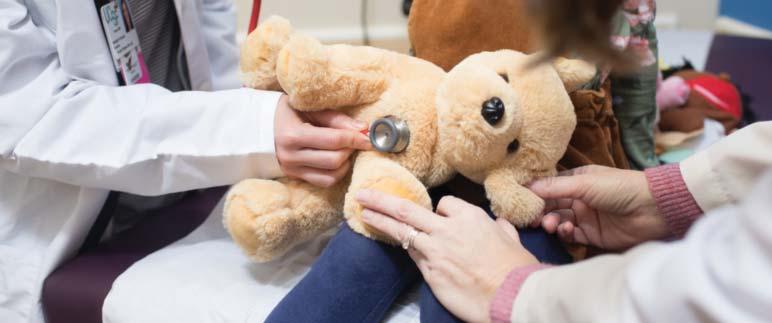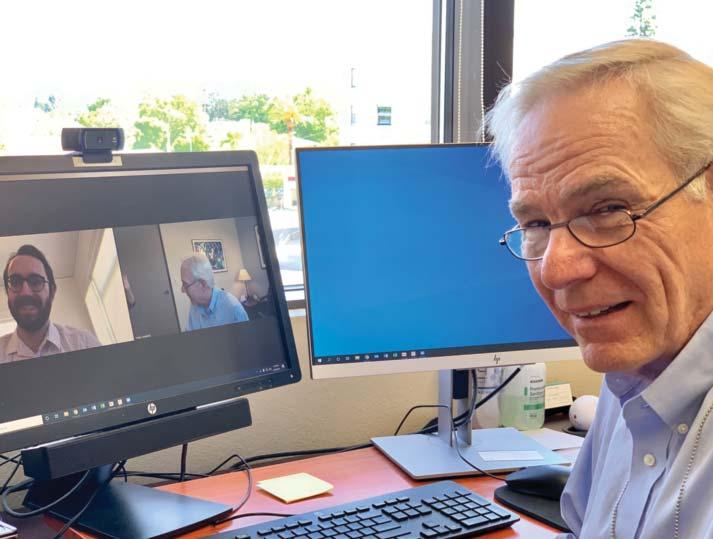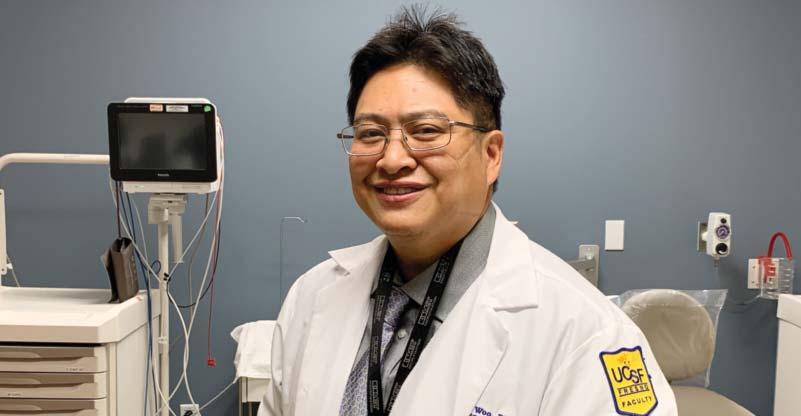
14 minute read
Patient Care
UCSF Fresno Pediatricians Collaborating with Community Partners to Provide Trauma-informed Awareness and Care
The UCSF Fresno Department of Pediatrics is collaborating with community partners and leveraging grant funding to increase awareness of Adverse Childhood Experiences (ACEs), pilot ACEs screening protocols, provide training in trauma-informed care (TIC) and develop a strong network of support for children and adults affected by ACEs.
Advertisement
“All of us, as providers recognize that an awareness of ACEs and screening patients for ACEs are important, but there was no infrastructure in place for provider training,” said John Moua, MD, interim chief of the UCSF Fresno Department of Pediatrics.
Last year, the California Department of Health Care Services (DCHS) began paying Medi-Cal providers for conducting ACEs screening of children and adults, and this year DCHS and the California Surgeon General’s office are providing ACEs Aware initiative grants for training of providers. The UCSF Fresno Department of Pediatrics received $180,000 to train Pediatric, OB/GYN and Family and Community Medicine providers in Fresno County. It is collaborating with two Fresno community-based organizations – Exceptional Parents Unlimited Children’s Center (EPU), and Every Neighborhood Partnership (ENP) – for the project.
“We are excited to be participating in these initiatives that are going to broaden or expand the incorporation of ACEs screening into pediatric practices all over the state,” said Aimee Abu-Shamsieh, MD, a UCSF Fresno pediatrician and UCSF clinical professor. “We are able to pilot practices in our clinic and be a part of the development of best practices for ACEs screening that can be shared with our pediatric colleagues throughout the state.”
Adversities experienced by age 18 from physical abuse, sexual abuse, exposure to violence and/or household dysfunctions are linked to an increased risk for chronic health problems, including heart disease, diabetes, and premature death. Many of the patients seen by UCSF Fresno pediatricians have experienced four or more ACEs, said Christian Faulkenberry-Miranda, MD, UCSF Fresno Department of Pediatrics program director, ambulatory residency clinic director and UCSF associate clinical professor. In its application for the ACEs Aware Supplemental Implementation Grant, the department said the COVID-19 pandemic has placed even more stress on families, increasing the need for partnerships in the training of providers to be able to recognize and respond to a surge of traumatic experiences.
EPU and ENP are helping produce an ACEs video that can be shown in physician offices to increase acceptance of the screening process. The video will explain why physicians screen for ACEs and highlight examples of protective factors for children. The ability to adapt to adverse experiences – resilience -during childhood can be an offset to toxic stress that children experience when they are exposed to traumatic experiences often and/or over long periods of time. EPU and ENP found volunteer families to videotape regular family moments, such as taking a walk or eating dinner together that illustrate how even small activities of daily living can help reduce stress.
“When parents go in to see the provider and the provider has a conversation with them about ACEs, we want to have already planted the seed for the focus to be on positive things, not necessarily over the negative things,” said Dana Riley, PhD, a licensed clinical psychologist, and manager of clinical services at the Assessment Center for Children at EPU. EPU serves children with medical, mental health and developmental needs and provides support to parents.
ENP Executive Director Andrew Feil has seen positive effects of resiliency. ENP connects churches and community groups to serve at elementary schools. “From our youth program that pairs students with mentors, we have seen kids from age five who now are graduating college,” he said. “We really wanted to be a part of the education on ACEs for ourselves to grow and learn, and also for the community.”
The UCSF Fresno Department of Pediatrics also will provide training on the clinical response to ACEs, including clinic workflows and information about local resources for patients in the Central Valley. The
ACEs training sessions will be conducted virtually, and will include physicians, nurse practitioners, medical assistants and office staff. “In many cases, medical assistants may be doing the ACEs screening and they may not quite understand why this is important because no one stops to tell them why it is important,” said Dr. Abu-Shamsieh.
With an $80,000 California ACEs Learning and Quality Improvement Collaborative (CALQIC) grant, the UCSF Fresno Department of Pediatrics will help providers implement PEARLS, the new ACEs screening tool developed by the Bay Area Research Consortium on Toxic Stress and Health (BARC), a partnership between the Center for Youth Wellness, UCSF and UCSF Benioff Children’s Hospital Oakland. UCSF Fresno is one of only 15 organizations throughout California to be awarded a CALQIC grant. CALQIC was launched in cooperation with the UCSF Center to Advance Trauma-Informed Healthcare to identify promising practices, tools, resources and partnerships to further inform California’s ACEs Aware initiative.
UCSF Fresno pediatricians adopted PEARLS screening in December at the 1-, 3and 5-year well-child visits. “We have incorporated trauma-informed care into our curriculum for the past few years,” said Amy Parks, DSW, LCSW, CLEC, and lead for the ACEs Aware grant. Parks is coordinator of Development and Behavioral Pediatrics, Community Pediatrics, Adolescent Medicine & Child Advocacy and director of Pediatric Healthy Steps at the UCSF Fresno Department of Pediatrics. “UCSF Fresno is really amazing in how supportive our faculty are of trauma-informed care practices and the time that has to be invested to make that culture change to provide trauma-informed care,” she said.
The UCSF Fresno Department of Family and Community Medicine, as part of the CALQIC grant, will soon implement PEARLS screening in its clinic for 1-, 3- and 5year well-child visits, said Ila Naeni, DO, a UCSF Fresno Family and Community Medicine associate program director and UCSF associate clinical professor. Long-term, the screening can be expanded to adults. “The screening is such an important part of making sure our patients in the Valley get the full, comprehensive care that they deserve,” Dr. Naeni said. “We serve a population at risk that could definitely benefit from the resources that go along with screening for ACEs.”
The UCSF Fresno Department of Pediatrics also is a partner in a $2.6 million ACES Aware Implementation Grant that is being administered by Saint Agnes Medical Center. Funding will allow community health workers to be placed in clinics, including those staffed by UCSF Fresno pediatricians and Family and Community Medicine physicians, Dr. Parks said. The workers will help link patients to resources, and inform physicians of resources their patients have accessed, she said.
The ACEs Aware and CALQIC grants are fostering new partnerships between community-based organizations and UCSF Fresno, Parks said. “It’s creating more receptive and effective and efficient linkages. And ultimately, it’s going to create a healthier Fresno – a more resilient Fresno.”
Partnerships are essential to successfully implementing the ACES grants, Dr. Moua said. “One of the strengths of the UCSF Fresno Department of Pediatrics is we are doing community-based medicine. We are mission-driven to take care of the community we serve; and we collaborate with community partners instead of just being in a silo by ourselves.” A couple of years ago, the UCSF Fresno Department of Psychiatry began using webcams for outpatient care and training purposes. The early implementation of such equipment has been a godsend in the pandemic, allowing outpatient training to continue with residents seeing patients in video sessions rather than in their offices to prevent potential exposure risks to COVID-19.
A 30-45-minute session with a patient in a small office is a high-risk interaction and UCSF Fresno halted outpatient training for residents last March when the COVID-19 pandemic started. Luckily, outpatient resident training was not disrupted for long because computer video equipment was available at University Psychiatry Associates (UPA), the faculty practice and residency training clinic. The pandemic had forced physician practices across the country to pivot to telemedicine and seemingly overnight, webcams became a scarce commodity. “You couldn’t buy them,” said Craig C. Campbell, MD, program director, UCSF Fresno Psychiatry Residency. “But we already had the equipment that we needed so we didn’t really skip a beat.”
Within two weeks of stopping in-person sessions, UCSF Fresno had converted 100% to telehealth psychiatry with help from Central California Faculty Medical Group (CCFMG) in securing a telehealth platform for the video sessions, Dr. Campbell said. “We had a lot of luck and tremendous support from CCFMG and their leadership and their IT (Information Technology). They made us look good, they made us look nimble,” he said.
UCSF Fresno Psychiatry Residency Program Pivots Outpatient Care and Training to Telemedicine During COVID-19 Pandemic
It was important that training and care not be interrupted. The San Joaquin Valley has among the lowest per capita ratios of behavioral health professionals to the population, according to the UCSF Healthforce Center. UCSF Fresno residents provide much needed mental health care while in training and about 60% of the UCSF Fresno residents remain in the region at completion of residency, Dr. Campbell said.
The challenge has been adapting faculty supervision protocols to an outpatient training model. Residents now connect with patients by logging into the telehealth system, and faculty can join sessions virtually for purposes of clinical oversight. During the early months of the pandemic, residents worked out of the UPA offices, but in the late fall, as COVID-19 cases surged, all residents began working from their homes.
“All of sudden, you’re working with patients and residents over a Zoom link, Dr. Campbell said. “Most of it has been a very steep, hands on learning curve; and I was learning right along with residents and with my patients, along with supervising residents’ work.”
This year, the UCSF Fresno Department of Psychiatry has a complement of 24 residents (six residents across four years, which completes a four-year expansion to increase class size in the department from four residents to six per class. Residents have adjusted to telemedicine but some have embraced it more than others, Dr. Campbell said.
Fourth-year resident who grew up in Fresno, Lisa Wise, MD, found it difficult to find suitable space to hold telemedicine sessions at home. Her 7-year-old son is online-learning at home so she opted to come into her office at UPA for telemedicine sessions. For some patients, finding a confidential space in which to have a session also has been a challenge, Dr. Wise said. “We (residents) had to catch on pretty quickly to ask ‘are you in a place where you can talk now? Is anyone else in the home with you?’”
Patients overall have been accepting of telemedicine, she said. For some, telehealth is more convenient, especially for those with transportation issues or who live far from the clinic. For others, however, an unfamiliarity with the technology has been an obstacle and some patients, especially among the elderly population have no internet connection, requiring telephone sessions. Surprisingly, these have gone well, Dr. Wise said. “Patients can feel self-conscious on video but talking on the telephone can help for some patients”, she said. “There’s a sense of anonymity and some open up about things they might not on video or even in person.” For others, particularly very paranoid patients, they might imagine others Before the pandemic, the UCSF Fresno Department of Psychiatry offered telemedicine as an elective for residents in their fourth year. Given an option, Dr. Wise said she would not have chosen telemedicine, but under the circumstances, she said, “I see it as a necessary part of training. We all need to understand how to do this now.”
Telemedicine was a big change, said Nicholas Betchel, DO, a third-year resident who grew up in the Central Valley and who plans to remain after residency. “We really relied on Dr. Campbell to navigate us through this,” he said. “And as a resident, I felt very cared for throughout all of this. They (UCSF Fresno) found the resources needed and provided them to us. Dr. Betchel has become comfortable using telemedicine and is open-minded about incorporating it into a practice in the future. “Patient outcomes haven’t worsened,” he said. “I’ve had some really good outcomes with video therapy and medication management.”
Residents who began their second year at UCSF Fresno in January were doing inpatient rotations when the pandemic started and have experienced only telemedicine in their outpatient training. Andrew Shiovitz, MD, a second-year resident, is thankful he does not have to worry about exposure to COVID-19 and of bringing the virus home to his pregnant wife and toddler son. Telemedicine is not without flaws. “But as long as COVID-19 is going to be a concern, I think this is the best thing to make sure we’re adept at doing this,” he said. As for whether he will prefer outpatient telemedicine over in-person sessions, it is too soon to tell, Dr. Shiovitz said. “This to me is outpatient work. I have nothing else to compare it to.”
As COVID-19 cases decrease and more people are vaccinated for the coronavirus, the need for training residents in telemedicine loses some urgency, but “very few people expect things to return to 100% pre-pandemic status,” Dr. Campbell said. People who have difficulty traveling to a clinic are very appreciative of telemedicine and are hoping it remains an option, even when the pandemic is over, he said. UCSF Fresno’s Department of Psychiatry is well-prepared for training physicians to provide excellent patient care by telemedicine to serve patients through this pandemic and beyond.

UCSF Fresno Oral and Maxillofacial Surgery is First in Nation to Use Robotic, 3D Microscope for Reconstructive Surgery
Patients with oral cancer in the San Joaquin Valley have been coming to the UCSF Fresno Oral and Maxillofacial Surgery (OMFS) Residency Program for two decades for state-of-the-art surgery and reconstruction. Now, the program is the first nationwide to use a robotic three-dimensional digital microscope for surgery to rebuild head and neck defects after tumor surgery.
Before we got here there was no one in the Valley doing this (microvascular free flap reconstructive surgery), on a regular basis for larger resections, said Brian Woo, DDS, MD, UCSF Fresno OMFS program director. The complex reconstructive surgery entails transplanting soft tissue, muscle or bone taken from elsewhere in the body to rebuild tongues, cheeks or jaws; and UCSF Fresno surgeons do several of these free flap surgeries a week. The procedure results in a better return of function for patients.
UCSF Fresno OMFS is committed to patient care. It takes cancer patients from start to finish (cancer resection to reconstruction) to get them back to their original form and function, Dr. Woo said.
For the past eight months, UCSF Fresno OMFS surgeons have been using the 3D Modus V digital microscope in free flap surgeries. Free flap surgery can take 10 to 14 hours. Transplanted tissues and bones need a blood supply – and the surgeon must sew blood vessels together that can be less than three millimeters in diameter or slightly larger than a pencil point. The 3D Modus V microscope gives surgeons increased visualization and an enlarged view of tissue during surgery, which can reduce surgery time and surgeon fatigue. “It’s better ergonomics for surgeons,” Dr. Woo said.
“Indeed, UCSF Fresno’s OMFS team is definitely the first in California and the nation to use our system for free flap reconstructive microsurgery,” Synaptive Clnical Applications Specialist Vatche Baboyan said in an email.
UCSF Fresno OMFS full-time faculty are fellowship trained (two in head and neck surgery and one in craniofacial surgery) and UCSF Fresno was the only OMFS service on the West Coast during microvascular reconstruction from 2010 through 2020, said Robert Julian, DDS, MD, OMFS program chief. “We are the only surgical service in central California that offers microvascular reconstruction after severe head and neck trauma or after cancer surgery,” he said.
OMFS faculty and residents provide a wide range of oral and maxillofacial care in the Valley. They respond to head and facial trauma at Community Regional Medical Center, one of the busiest Level 1 trauma centers in California. They also treat and operate on patients at Valley Children’s Healthcare, the VA Central California Health Care System, Saint Agnes Medical Center, Kaiser Permanente Fresno, and Clovis Community Medical Center. In addition, about 15,000 patients a year are treated as outpatients.
We offer services that are rarely handled by any other OMFS or ear, nose and throat surgeons in central California, Dr. Julian said. The services include: Vagal Nerve Stimulator placement for seizure, Hypoglossal Nerve stimulator for sleep apnea, skull base surgical access for neurosurgery, head and neck cancer, microvascular reconstruction of head and neck, major reconstructive procedures of head and neck in general, an application of embryonic tissue grafting in head and neck reconstruction.
Oral and pharyngeal cancer is the 12th most common cancer in California. The American Cancer Society estimates there will be 5,320 new cases in 2021. According to the 2020 oral health assessment of Fresno County by the Central Valley Health Policy Institute, there were 93 newly diagnosed oral and pharyngeal cancers in 2016 in the county.
UCSF Fresno OMFS faculty and residents work with UCSF Fresno oncologists at the Community Cancer Institute in Clovis in providing care before and after surgery for oral and pharynx cancer. “We formulate a plan for the patient all together,” Dr. Woo said.
UCSF Fresno OMFS provides services to a broad patient population and turns no patient away for care, Dr. Julian said. “We are well trained, very experienced and always up-to-date and innovative,” he said, emphasizing, ‘always.’ This is what is required to ensure the best possible outcomes for our patients.”

Brian Woo, DDS, MD,










